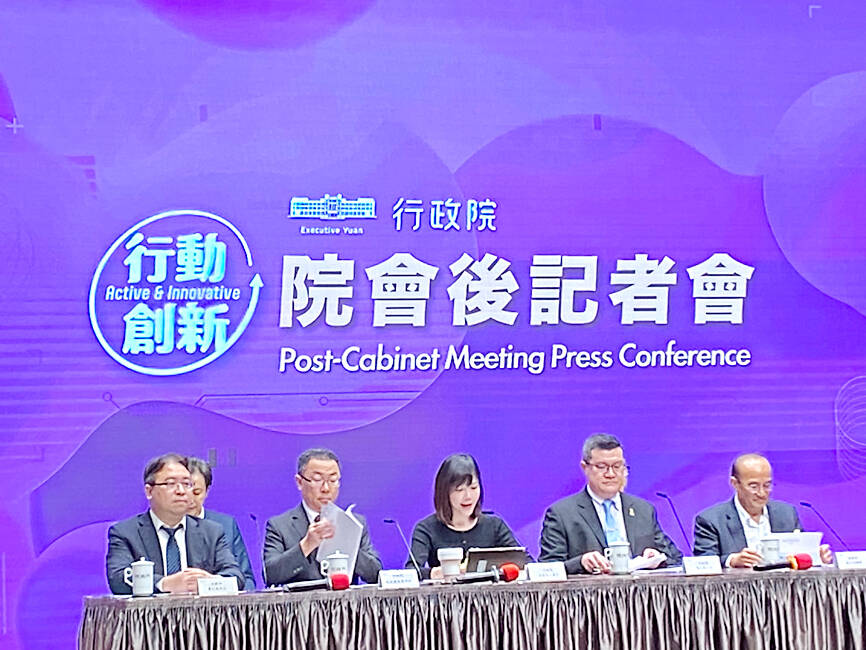The Executive Yuan yesterday approved a proposed amendment to the Civil Code that would prohibit parents from harming the mental and physical health of their children when disciplining them.
Article 1085 of the Civil Code stipulates that parents may, within the limit of necessity, punish their children. The article is widely perceived as a legal basis that establishes the right of parents to punish their children.
The amendment proposed by the Ministry of Justice would delete the statement and change it to: “Parents should protect and raise underage children by considering their age and mental development and respecting their character. They must not engage in violent behaviors that harm mental and physical health.”

Photo: Chung Li-hua, Taipei Times
The proposed changes face further deliberation in the legislature.
The ministry said it consulted Article 19 of the Convention on the Rights of the Child and the Control Yuan’s National Human Rights Commission, adding that the wording of the proposed amendment is in line with similar statutes that Japan and South Korea passed in the past few years.
The purpose of the proposed change is to clarify the principle that parents should follow when they exercise their right to discipline their children, the ministry said, adding that supporting measures would be stipulated in the Protection of Children and Youths Welfare and Rights Act (兒童及少年福利與權益保障法).
Minister Without Portfolio Lin Min-hsin (林明昕) said that courts in multiple cases have established that parents must not harm their children’s mental and physical health when disciplining them, a “red line” that parents must not cross.
The judicial system and parental education policies would not change significantly because of the proposed amendment, Lin said.
The proposal is not intended to prohibit parental discipline of their children, Department of Protective Services Deputy Director Kuo Tsai-jung (郭彩榕) said.
“We hope that they would adopt a more positive approach,” Kuo said.
The Ministry of Education said that parents can seek advice at family education centers across the country.
They can also consult the ministry’s family education Web site at https://familyedu.moe.gov.tw or call the family education hotline on (02) 412-8185, the education ministry added.

INVESTIGATION: The case is the latest instance of a DPP figure being implicated in an espionage network accused of allegedly leaking information to Chinese intelligence Democratic Progressive Party (DPP) member Ho Jen-chieh (何仁傑) was detained and held incommunicado yesterday on suspicion of spying for China during his tenure as assistant to then-minister of foreign affairs Joseph Wu (吳釗燮). The Taipei District Prosecutors’ Office said Ho was implicated during its investigation into alleged spying activities by former Presidential Office consultant Wu Shang-yu (吳尚雨). Prosecutors said there is reason to believe Ho breached the National Security Act (國家安全法) by leaking classified Ministry of Foreign Affairs information to Chinese intelligence. Following interrogation, prosecutors petitioned the Taipei District Court to detain Ho, citing concerns over potential collusion or tampering of evidence. The

NEGOTIATIONS: Taiwan has good relations with Washington and the outlook for the negotiations looks promising, Minister of Economic Affairs J.W. Kuo said Taiwan’s GDP growth this year is expected to decrease by 0.43 to 1.61 percentage points due to the effects of US tariffs, National Development Council (NDC) Minister Paul Liu (劉鏡清) said at a meeting of the legislature’s Economics Committee in Taipei yesterday, citing a preliminary estimate by a private research institution. Taiwan’s economy would be significantly affected by the 32 percent “reciprocal” tariffs slapped by the US, which took effect yesterday, Liu said, adding that GDP growth could fall below 3 percent and potentially even dip below 2 percent to 1.53 percent this year. The council has commissioned another institution

NEGOTIATIONS: The US response to the countermeasures and plans Taiwan presented has been positive, including boosting procurement and investment, the president said Taiwan is included in the first group for trade negotiations with the US, President William Lai (賴清德) said yesterday, as he seeks to shield Taiwanese exporters from a 32 percent tariff. In Washington, US Trade Representative Jamieson Greer said in an interview on Fox News on Thursday that he would speak to his Taiwanese and Israeli counterparts yesterday about tariffs after holding a long discussion with the Vietnamese earlier. US President Donald Trump on Wednesday postponed punishing levies on multiple trade partners, including Taiwan, for three months after trillions of US dollars were wiped off global markets. He has maintained a 10 percent

TRADE: The premier pledged safeguards on ‘Made in Taiwan’ labeling, anti-dumping measures and stricter export controls to strengthen its position in trade talks Products labeled “made in Taiwan” must be genuinely made in Taiwan, Premier Cho Jung-tai (卓榮泰) said yesterday, vowing to enforce strict safeguards against “origin laundering” and initiate anti-dumping investigations to prevent China dumping its products in Taiwan. Cho made the remarks in a discussion session with representatives from industries in Kaohsiung. In response to the US government’s recent announcement of “reciprocal” tariffs on its trading partners, President William Lai (賴清德) and Cho last week began a series of consultations with industry leaders nationwide to gather feedback and address concerns. Taiwanese and US officials held a videoconference on Friday evening to discuss the